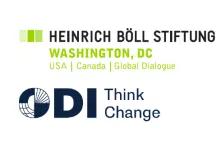Climate & Environmental Policy
Dossiers
More dossier about Climate & Environmental Policy (10)
Articles
More articles about Climate & Environmental Policy (309)
Publications
More publications about Climate & Environmental Policy (328)
More pages about Climate & Environmental Policy
© Heinrich-Böll-Stiftung e.V.
Schumannstraße 8
10117 Berlin
T +49 (30) 285 34-0
F +49 (30) 285 34-109
www.boell.de
info@boell.de






























